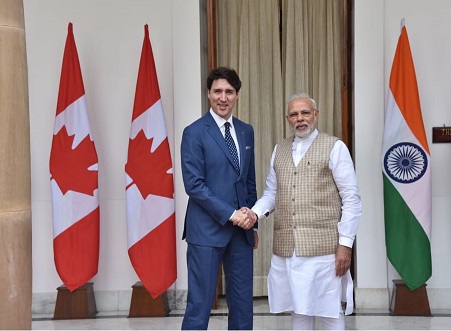India-Canada Visa Dispute: Unraveling the Diplomatic Standoff
In recent days, international headlines have been dominated by a rapidly escalating diplomatic dispute between India and Canada. What began as a war of words and accusations has now manifested into concrete actions with the suspension of new visas for Canadians by India and a request from New Delhi for Ottawa to reduce its diplomatic presence in the country. This unprecedented move has sent shockwaves through the international community, raising questions about the future of India-Canada relations, security concerns, and even the potential impact on trade ties. In this article, we will delve deep into the heart of this diplomatic standoff, examining the key players, the historical context, and the potential consequences.
The Accusations that Ignited the Fire: India
The unprecedented tensions between India and Canada can be traced back to Prime Minister Justin Trudeau’s unexpected and controversial statements. Trudeau publicly suggested that Ottawa was investigating “credible allegations” of Indian government agents’ potential involvement in the murder of Hardeep Singh Nijjar in British Columbia back in June. This statement set off alarm bells in New Delhi, as it implied a grave accusation against the Indian government.
However, it is important to note that the Indian government vehemently denies any links to the alleged murder and has repeatedly called for concrete evidence to substantiate these claims. Despite this, Canadian officials have not provided a clear rationale for why they believe India could be connected to Nijjar’s murder. This lack of clarity on the part of Canada has only served to intensify the dispute.
The Sikh Separatist Issue: A Thorny History
To understand the depth of this conflict, we must also consider the historical backdrop of India-Canada relations, particularly regarding Sikh separatist movements. Canada is home to the largest population of Sikhs outside of India, with approximately 770,000 people identifying Sikhism as their religion in the 2021 census. The historical context is crucial because it sheds light on why India views Sikh separatist activities in Canada with suspicion.
In the 1980s and 1990s, India grappled with a bloody Sikh insurgency in the state of Punjab, which resulted in the deaths of tens of thousands of people. The separatists’ primary objective was the creation of an independent Sikh state called Khalistan. Although the insurgency in India has largely dissipated, small groups of Sikhs in various countries, including Canada, continue to support the separatist demand and occasionally stage protests outside Indian embassies.
This lingering separatist sentiment has been a constant source of concern for New Delhi, which remains vigilant against any potential resurgence of the insurgency. The accusations made by Prime Minister Trudeau only added fuel to the fire, as they seemed to resurrect old wounds and suspicions.
Escalation and Tit-for-Tat Measures
In response to Trudeau’s accusations, India and Canada swiftly announced tit-for-tat expulsions of senior diplomats and issued travel advisories. These measures reflect the deteriorating state of bilateral relations and the severity of the diplomatic standoff.
Canada’s high commission in India also announced that it would temporarily “adjust” staff presence in the country due to threats received by some diplomats on social media platforms. Although the nature of these threats remains unspecified, India has assured foreign diplomats of its commitment to providing “all security and all support.”
Visa Suspensions: Unprecedented and Unheard Of
One of the most remarkable developments in this diplomatic standoff is India’s decision to suspend the issuance of new visas for Canadian citizens. This move is exceptional, as it represents a blanket suspension of new visas for a Western country, an action virtually unheard of in diplomatic circles.
The Indian foreign ministry cited “security threats” to its staff in consulates in Canada as the primary reason for this unprecedented step. However, specific details regarding the nature of these security threats have not been disclosed. In response, Canada’s public safety minister, Dominic LeBlanc, emphasized that Canada is indeed a safe country, thereby challenging the rationale behind India’s visa suspension.
Impact on Trade and Tourism
Beyond the realm of diplomacy and security, this dispute has the potential to inflict collateral damage on trade and tourism between the two nations. Canada is India’s 17th largest foreign investor, and Canadian portfolio investors have injected substantial funds into Indian financial markets. Furthermore, since 2018, India has been the largest source of international students in Canada, with their numbers rising by 47% in 2022 to nearly 320,000.

However, the ongoing tensions have put a freeze on talks regarding a proposed trade deal, jeopardizing potential economic benefits for both countries. The tit-for-tat measures and the negative international attention could discourage foreign investment and hinder economic cooperation.
The Global Perspective
The India-Canada dispute has not gone unnoticed on the global stage. Key allies of both nations, including members of the Five Eyes intelligence sharing alliance (the United States, Britain, Australia, and New Zealand), have expressed concern over the escalating tensions. While India enjoys close ties with these countries, discussions have taken place, and positions have been conveyed regarding the developments in the standoff.
Conclusion: A Growing Diplomatic Challenge
In conclusion, the India-Canada diplomatic standoff is a complex and rapidly evolving situation that has far-reaching implications. The accusations and subsequent actions have strained relations between the two nations, raised security concerns, and threatened to disrupt trade ties. As the dispute continues to unfold, the international community watches closely, hoping for a peaceful resolution to what has become a growing diplomatic challenge.
In times of uncertainty like these, it is imperative for both India and Canada to engage in open dialogue, share information, and work towards rebuilding trust. The world is watching, and the stakes are high for both nations.